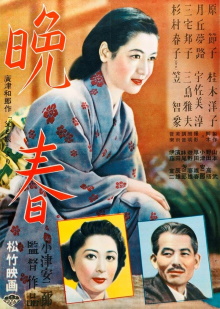This film was the first of the director’s collaborations with actress Setsuko Hara and forms part of his so-called Noriko Trilogy. In all three films of the trilogy, Nara plays an unmarried woman named Noriko though they are all of course different characters. I feel that this is actually the most sophisticated and avant-garde of the director’s films that I have seen so far as the themes here go beyond the traditional ones of wholesome family values to venture into darker territory.
At the age of 27, Noriko is still unmarried and that makes her family worried. However she is happy living with her widower father and taking care of his daily needs, firmly rejecting any romance for herself. She is able to be friends with a young man who works as her father’s assistant and while everyone expects her to marry him, she reveals that he already has a fiancée. She even expresses distaste when a meeting a friend of her father who has remarried, commenting that she feels it is dirty. Eventually her aunt insists on matchmaking her with a promising young man and when Noriko replies that she doesn’t want to leave her father alone without without to care for him, even notes that she has found a widow that her father could marry as well. Under pressure from all sides including her father, she has no choice but to give in.
At first this shapes up as if it’s going to be similar to one of the other Ozu films we’ve seen so far with a strong focus on filial piety. Noriko’s smiles are so bright and cheery during a bicycle outing with her father’s assistant that my wife commented on it and when she worries about her father on his own without her help, we’re led to believe that this is something praiseworthy. But slowly we are led to realize that the extent of her attachment to her father is something that is abnormal and unhealthy, beginning with her strong burst of jealousy when she realizes that her father may well have an interest in the widow after all. While she at first frames her reluctance to leave his side as being due to his inability to fend for himself, the truth that emerges is that it is she who needs him. She is wholly dependent on him financially and as she later admits, she cannot imagine being any happier married than at her father’s side and begs to be allowed to stay.
This is of course extraordinary in that it is almost unheard of to have a story about a child who is too devoted to a parent. A Western film about similar themes probably wouldn’t be able to avoid being explicitly incestuous but this film is far more subtle. There is nothing sexual whatsoever in Noriko’s relationship with her father but in all other respects she does seem to act as a wife, preparing his meals, seeing to his bath and so on, and finds satisfaction and meaning in this role. As her father himself points out to her, this is an unhealthy and unsustainable relationship and so regrets having kept her at his side for too long. As befits this being a complex masterpiece, there are also all kinds of subtle undercurrents behind this state of affairs. Noriko’s friend for example has recently divorced and rejoices at being financially independent while exhorting Noriko to get married and to just to leave the husband if she ends up not liking it. The devastation of the war with the deaths of many eligible men and the economic depression probably also contributes to Noriko remaining unmarried for so long. This is indeed Ozu’s greatest strength as a director. While this is an intensely personal family drama, it also encapsulates the changes going on in the wider society.
I initially underestimated this film and indeed was starting to find Noriko’s enforced cheeriness off-putting. But as I should have known, Ozu is indeed a true master and highlights her happiness in the beginning only to accentuate her misery later on. Similarly he subverts the traditional message of filial piety with a far darker and hence more original theme than any of his other works we’ve seen so far. I believe that there is even more in this than I can truly understand, for example the Noh performance that Noriko attends with her father probably encapsulates specific shades of meaning that cannot be properly conveyed by a direct translation. No wonder this film has inspired so much commentary and scholarship and that is why I am shocked by how modern and sophisticated this film is while being presented in utter simplicity.
